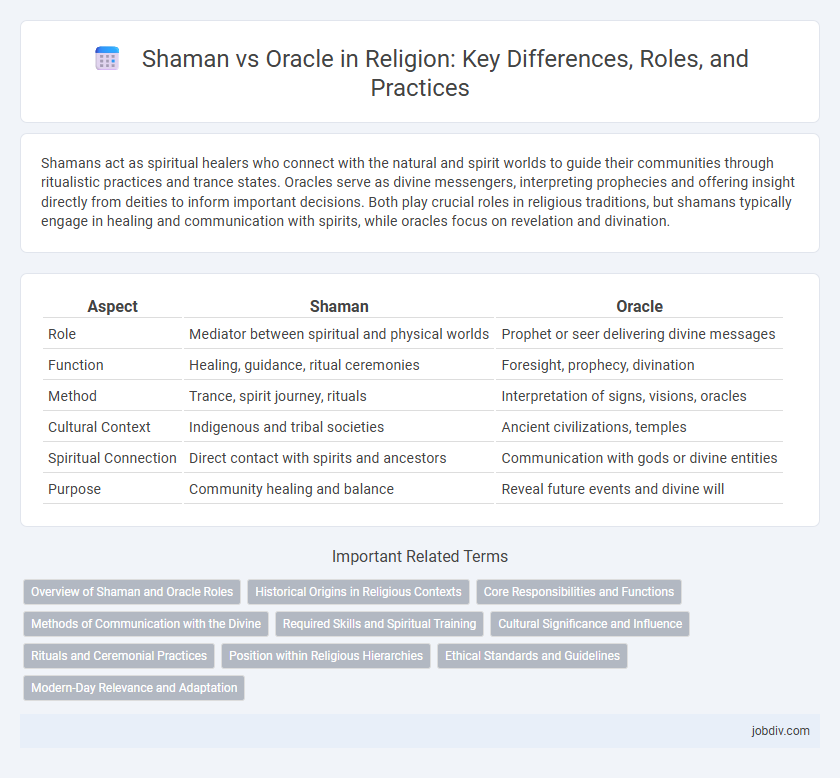Shamans act as spiritual healers who connect with the natural and spirit worlds to guide their communities through ritualistic practices and trance states. Oracles serve as divine messengers, interpreting prophecies and offering insight directly from deities to inform important decisions. Both play crucial roles in religious traditions, but shamans typically engage in healing and communication with spirits, while oracles focus on revelation and divination.
Table of Comparison
| Aspect | Shaman | Oracle |
|---|---|---|
| Role | Mediator between spiritual and physical worlds | Prophet or seer delivering divine messages |
| Function | Healing, guidance, ritual ceremonies | Foresight, prophecy, divination |
| Method | Trance, spirit journey, rituals | Interpretation of signs, visions, oracles |
| Cultural Context | Indigenous and tribal societies | Ancient civilizations, temples |
| Spiritual Connection | Direct contact with spirits and ancestors | Communication with gods or divine entities |
| Purpose | Community healing and balance | Reveal future events and divine will |
Overview of Shaman and Oracle Roles
Shamans serve as spiritual healers and mediators between the physical world and the spirit realm, often engaging in rituals to restore balance and communicate with ancestral spirits. Oracles act as prophetic figures who deliver divine messages and guidance, interpreting signs and visions to advise communities or leaders. Both roles are integral in religious traditions, facilitating spiritual insight and connection, though shamans emphasize healing and spirit mediation while oracles focus on prophecy and divine communication.
Historical Origins in Religious Contexts
Shamans trace their historical origins to ancient animistic traditions where they acted as intermediaries between the spiritual and physical worlds, performing rituals to heal and communicate with spirits. Oracles, rooted in classical antiquity, particularly in Greek and Roman religions, served as prophetic intermediaries delivering divine messages from gods, often through altered states of consciousness or sacred sites like Delphi. Both roles reflect early human attempts to understand and influence the unseen forces shaping their societies through spiritual mediation.
Core Responsibilities and Functions
Shamans serve as spiritual healers and intermediaries who enter altered states to communicate with spirits, guiding communities through rituals and healing practices. Oracles, on the other hand, function primarily as prophetic mediums, delivering divine insights and future predictions to guide decision-making. Both play vital roles in their cultures' spiritual frameworks but differ in methods and focus: shamans emphasize healing and spirit connection, while oracles prioritize foretelling and divine consultation.
Methods of Communication with the Divine
Shamans enter altered states of consciousness through ritualistic drumming, chanting, or the use of psychoactive plants to communicate with spirits and ancestors. Oracles receive divine messages primarily through prophetic visions, trance-induced revelations, or symbolic interpretations during sacred ceremonies. Both employ unique spiritual techniques to bridge the human and divine realms, but shamans emphasize direct spirit interaction while oracles focus on interpreting divine will.
Required Skills and Spiritual Training
Shamans require mastery in healing techniques, trance induction, and direct communication with spirit guides through rigorous spiritual training often involving isolation and ritualistic practices. Oracles emphasize skills in divination, prophecy, and interpreting symbolic messages from deities or the cosmos, relying heavily on meditative discipline and preparation guided by sacred texts or ancestral knowledge. Both roles demand heightened intuition, deep empathy, and consistent spiritual cleansing to maintain clarity and connection with higher realms.
Cultural Significance and Influence
Shamans hold a pivotal role in indigenous cultures, acting as intermediaries between the physical and spiritual worlds to heal and guide communities through rituals and ceremonies. Oracles, prominent in ancient civilizations such as Greece, serve as prophetic mediums, delivering divine messages that influence political and personal decisions. Both figures profoundly shape cultural traditions, reinforcing spiritual beliefs and societal values through their unique methods of communication with the supernatural.
Rituals and Ceremonial Practices
Shamans perform rituals involving spirit journeys, trance states, and the use of natural elements like herbs and drums to communicate with ancestral spirits. Oracles practice ceremonial divination through oracular pronouncements, often relying on sacred texts, symbols, oracles' temples, and ritualistic question sessions to interpret divine messages. Both roles emphasize ritual purity and symbolic acts, but shamans engage directly with spiritual realms, while oracles serve as intermediaries conveying predetermined divine will.
Position within Religious Hierarchies
Shamans often occupy a decentralized role within indigenous religious hierarchies, serving as intermediaries between the material and spiritual worlds through trance and healing rituals. Oracles, by contrast, typically hold a more institutionalized position within formal religious systems, providing divinatory insights sanctioned by temples or religious authorities. The authority of oracles is often linked to specific cults or priesthoods, whereas shamans derive their legitimacy from personal spiritual experiences and community recognition.
Ethical Standards and Guidelines
Shamans adhere to ethical standards centered on community healing, maintaining harmony with nature, and respecting ancestral wisdom through rituals and spiritual practices. Oracles operate within a framework guided by divine inspiration and prophetic insight, emphasizing truthfulness, impartiality, and the responsible communication of messages from higher powers. Both roles underscore integrity and accountability, ensuring their guidance supports the spiritual wellbeing of individuals and societies.
Modern-Day Relevance and Adaptation
Shamans and oracles maintain modern-day relevance by adapting their traditional roles to contemporary spiritual practices and holistic healing methods. Shamans increasingly incorporate psychotherapy, energy healing, and environmental activism, while oracles often engage in intuitive guidance through tarot, astrology, and digital platforms. Both continue to influence personal growth and community well-being by integrating ancient wisdom with modern tools.
Shaman vs Oracle Infographic

 jobdiv.com
jobdiv.com